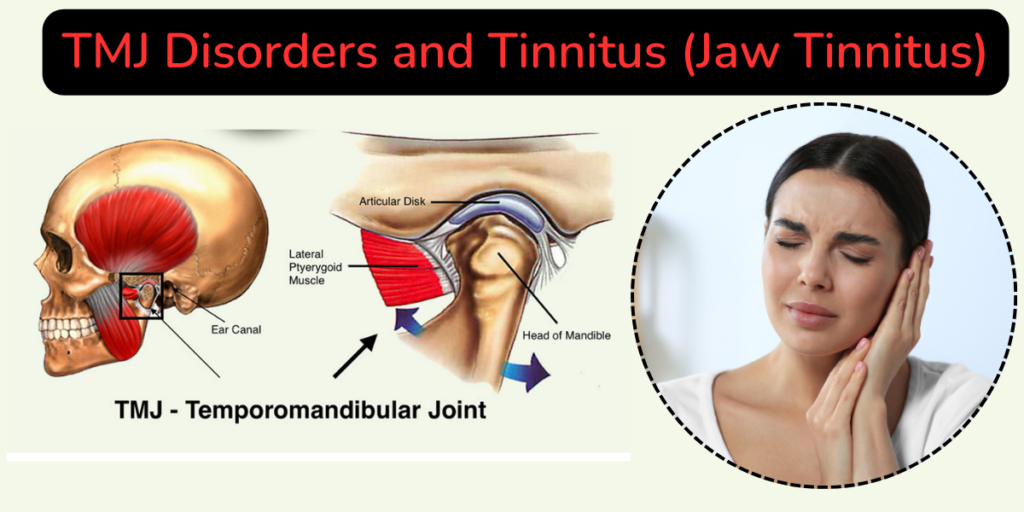
TMJ Disorders and Tinnitus (Jaw Tinnitus) : Relationship and Treatment
If you’ve ever experienced jaw pain or ringing in your ears, you might be wondering if there’s a connection between the two. Many people are unaware that TMJ disorders and tinnitus can be linked. In this post, we’ll explore what TMJ disorders and tinnitus are, how they relate to each other, and effective treatment options you can consider.
What Are TMJ Disorders?
TMJ stands for temporomandibular joint, which connects your jaw to your skull. When something goes wrong with this joint, it can lead to TMJ disorders. Symptoms can include:
- Jaw pain or tenderness
- Clicking or popping sounds when moving the jaw
- Difficulty chewing
- Headaches
- Earaches
These issues can stem from various causes, such as injury, teeth grinding, arthritis, or stress.
What Is Tinnitus?
Tinnitus is the perception of noise or ringing in the ears without an external source. It’s not a condition itself but rather a symptom of an underlying problem, which could be hearing loss, ear injury, or even certain health conditions. Symptoms of tinnitus can vary widely, but common experiences include:
- Ringing, buzzing, or hissing sounds in one or both ears
- Hearing loss
- Difficulty concentrating
The Relationship Between TMJ Disorders and Tinnitus
You might be surprised to learn that TMJ disorders can contribute to tinnitus. The temporomandibular joint is located very close to the ear, and any dysfunction in this area can affect how you hear and process sound. Here’s how they are connected:
- Muscle Tension: TMJ disorders can lead to muscle tension in the jaw, which may create pressure on the auditory system, causing or worsening tinnitus.
- Nerve Interference: The nerves that control the jaw also interact with the auditory system. If these nerves are compromised due to TMJ issues, it can trigger tinnitus symptoms.
- Stress: Both TMJ disorders and tinnitus can be exacerbated by stress. When you’re stressed, you may clench your jaw or grind your teeth, worsening TMJ problems and potentially leading to tinnitus.
Treatment Options for TMJ Disorders and Tinnitus
If you suspect your tinnitus is related to TMJ disorders, it’s essential to consult a healthcare professional for an accurate diagnosis and tailored treatment plan. Here are some common treatment options:
- Lifestyle Changes :
Stress Management: Practices like yoga, meditation, or deep-breathing exercises can help reduce stress, potentially easing both TMJ symptoms and tinnitus.
Diet Adjustments: Eating softer foods can minimize jaw strain. Avoiding caffeine and alcohol might also help reduce tinnitus. - Physical Therapy :
A physical therapist can help you with exercises that strengthen jaw muscles and improve your range of motion. They may also use techniques like ultrasound therapy to alleviate pain. - Dental Treatment :
If teeth grinding is a factor, your dentist may recommend a night guard. This can help prevent damage to your teeth and relieve pressure on the TMJ. - Medications :
Over-the-counter pain relievers like ibuprofen or prescription medications may help with TMJ pain and reduce inflammation. If tinnitus is a significant issue, your doctor might prescribe medications specifically for that. - Supplements :
Many people find relief with natural supplements. One supplement to consider is Quietum Plus, which has gained attention for its potential benefits in treating tinnitus. Formulated with natural ingredients, it aims to support ear health and may help alleviate ringing or buzzing sounds. Always consult with a healthcare provider before starting any new supplement.
Quietum Plus
Quietum Plus is a natural supplement specifically formulated to support ear health and combat tinnitus. Packed with powerful ingredients, it aims to reduce ringing and buzzing sounds, helping you regain peace of mind. By promoting overall auditory function, Quietum Plus could be your key to enjoying clearer, quieter days. Don’t let tinnitus hold you back—consider adding Quietum Plus to your wellness routine for a healthier, more serene life!

FAQ: TMJ Disorders and Tinnitus
Q1: Can TMJ disorders cause tinnitus?
A: Yes, TMJ disorders can lead to tinnitus due to the close relationship between the jaw joint and the auditory system.
Q2: What are the symptoms of TMJ disorders?
A: Symptoms can include jaw pain, clicking sounds, headaches, earaches, and difficulty chewing.
Q3: How can I relieve tinnitus related to TMJ?
A: Stress management, physical therapy, dental treatments, and possibly supplements like Quietum Plus can help alleviate symptoms.
Q4: Is there a permanent cure for tinnitus?
A: There’s currently no definitive cure for tinnitus, but various treatments can help manage symptoms effectively. Many people find relief through lifestyle changes, therapy, or medications. Additionally, consider exploring natural supplements like Quietum Plus, which is designed to support ear health and may help alleviate ringing or buzzing sounds. Watching or purchasing Quietum Plus could be a great step toward finding the relief you’re looking for!
Q5: Should I see a doctor for TMJ or tinnitus?
A: Yes, consulting a healthcare professional is essential for accurate diagnosis and personalized treatment.
Conclusion
Understanding the relationship between TMJ disorders and tinnitus is crucial for anyone experiencing these symptoms. With the right combination of lifestyle changes, physical therapy, dental treatment, and possibly supplements like Quietum Plus, you can take steps towards relief. Don’t hesitate to seek professional help to explore your options further. Your comfort and well-being are worth it!
